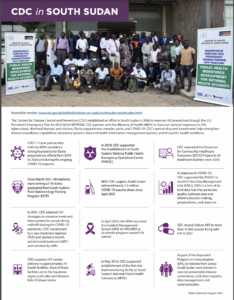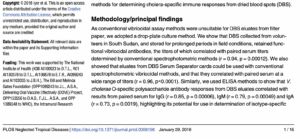Sudan’s National Public Health Laboratory – whose recent seizure by militants has prompted warnings of causing a “huge biological risk” – received financial and personnel support from U.S. government bodies including the Department of Defense, Centers for Disease Control and Prevention, and Dr. Anthony Fauci’s National Institutes of Health agency, War Room can reveal.
The stunning revelation follows Nima Saeed Abid, the World Health Organization (WHO) representative in Sudan, admitting the situation was “extremely dangerous” because “we have polio isolates in the lab, we have measles isolates in the lab, we have cholera isolates in the lab.” U.S. federal funding has directly supported research conducted by researchers from the high-risk laboratory into cholera.
“There is a huge biological risk associated with the occupation of the central public health lab in Khartoum by one of the fighting parties,” he added.
The lab, which is based in the country’s capital Khartoum, is a recipient of support from a variety U.S. government agencies including the Department of Defense (DOD), Centers for Disease Control and Prevention(CDC), and United States Agency for International Development (USAID). During Dr. Fauci’s tenure as a National Institutes of Health (NIH) agency leader, he also allocated funds to support research involving scientists from the controversial laboratory.
CDC.
A pamphlet titled “CDC In South Sudan,” published in August of 2022, reveals the extent of the government agency’s involvement in the country.
“In May 2018, CDC supported establishment of the first viral load monitoring facility at South Sudan’s National Public Health Laboratory (NPHL),” explains a synopsis of the CDC’s involvement with the lab.
A key feature of the CDC’s involvement with the lab was “Laboratory Systems Strengthening,” with the agency noting:
“Since 2006, CDC has partnered with the Global Fund to support South Sudan’s NPHL by strengthening laboratory infrastructure, staffing, and technical capacity.”
“With technical support from CDC, the Ministry of Health developed and released consolidated national HIV treatment guidelines and five laboratory manuals and standard operating procedures for NPHL staff and HIV/AIDS program staff,” continues the CDC.

Moreover, a research paper published in July 2022 – “Viral load scale-up in South Sudan: Strategic implementation of tools to monitor HIV treatment success among people living with HIV” – involving the controversial Sudanese laboratory counts financial support from the CDC through the President’s Emergency Plan for AIDS Relief. The paper includes two researchers from the NPHL alongside four CDC researchers from the Divisions of Global HIV & TB and Healthcare Quality Promotion.

The paper’s acknowledgment section also identifies the “US Agency for International [and] Development, US Department of Defense” for providing the researchers with “support,” though it fails to provide any further information.
FAUCI/NIH.
National Institute of Allergy and Infectious Diseases (NIAID), the NIH agency previously run by Dr. Fauci, has also funded a research paper counting researchers from Sudan’s NPHL. Curiously, the 2017 paper – “Dried Blood Spots for Measuring Vibrio cholerae-specific Immune Responses” – focuses on cholera in Sudan, which is one of the diseases flagged by the WHO as being affected by the seizure.
A researcher listed on the paper, Lul O. Deng, works for the Sudanese NPHL.
“This work was supported by The National Institute of Health (K08 AI100923 to D.T.L., R01 AI130378 to D.T.L., AI106878 to E.T.R., AI099243 and AI103055 to J.B.H.),” explains the paper.
The aforementioned grants all come from the NIAID during Fauci’s tenure and totals over 20 million dollars, as revealed in the breakdown below:
- K08 AI100923: $685,800
- R01 AI130378: $1,805,616
- AI106878: $7,341,083
- AI099243: $7,877,483
- AI103055: $3,850,785
The Bill and Melinda Gates Foundation were also co-funders of the study.

USAID.
USAID increased its collaborations with the lab during COVID-19, with a press release revealing it “funded procurement of COVID-19 tests and provided equipment” and “designated regional laboratories to rapidly scale up testing capabilities.”
A WHO press release from 2018 also reveals the agency’s involvement with the NPHL:
‘Thanks to Global Fund, ECHO, CDC and USAID, South Sudan has made progress in building and strengthening the laboratory capacity to test and report results in a safe, secure, timely and reliable manner for outbreaks and emergencies, the challenging circumstances notwithstanding said Evans Liyosi, WHO Representative for South Sudan. He noted that this development is in line with the expectations of the WHO Laboratory Improvement for Emergencies (LIFE) initiative and the International Health regulations, for vulnerable WHO member states including South Sudan.”
Deja Vu.
The revelations about U.S. government involvement in Sudan’s NPHL follow similar scrutiny over support from a Hunter Biden-linked company for Ukrainian Biolabs working on “extremely dangerous pathogens.” It also follows Dr. Fauci allocating millions of taxpayer dollars to support gain-of-function research on coronavirus strains strikingly similar to COVID-19 at the Wuhan Institute of Virology.
Source – https://warroom.org/us-govt-funded-seized-sudanese-biolab/
